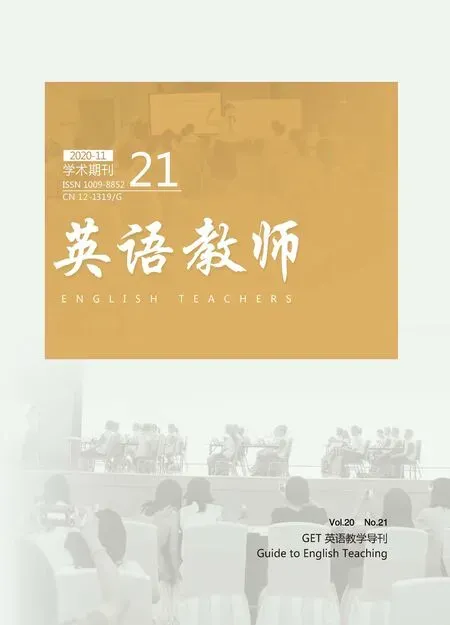借力多模態資源的高中英語課外閱讀教學設計
——以課外閱讀文本My First Job為例
陳敏之
引言
近年來,教育界呼吁:在“互聯網+”時代,英語閱讀教學不能停留在傳統的注重語言形式的單一教學模式上,而應探索利用多種符號模態(語言、視頻、圖像、音樂、網絡等),充分調動學生的多種感官系統,刺激其閱讀后的多方面聯想與體驗,從而增強他們的記憶,達成閱讀教學的效能感(劉東燕 2018)。這也符合《普通高中英語課程標準(2017年版)》(以下簡稱《課程標準》)對于培養學生聽、說、讀、寫、看等語言能力的要求(教育部2018)。同時,教學研究表明,多模態教學模式不僅能有效激活學生的各種感官,而且可以幫助其強化跨文化交際的文化意識,提升邏輯、批判、創新的思維品質,培養積極、主動的學習能力(呂美嘉、牟為姣 2014)。
一、借力多模態資源的高中英語課外閱讀教學案例
下面,以教師執教的高中英語課外閱讀文本My First Job(Robert Best)為例,探討借力多模態資源的高中英語課外閱讀課教學設計。
(一)教學內容
授課內容是課外閱讀文本My First Job(見附錄),這是一篇記敘文,主題是“人與社會”。該文本遵循“情境—發展—結果”的模式,生動地展現了作者的第一份工作,其中包括到達工作場所的路途、學校概況、校長、教學要求、薪酬水平等信息,并從中體現作者的情緒變化(from bad to worse,and from worse to the worst)及其選擇。教學內容與學生的實際生活聯系緊密,學生理解起來難度不大。此外,學生可以在判斷作者的選擇明智與否的過程中培養批判性思維和發散性思維。
(二)學情
授課學生英語基礎扎實,具備良好的英語閱讀能力,能夠聽懂全英文授課。同時,學生能夠通過合作學習,較恰當地描述問題和進行評價。
(三)教學目標
為了提升學生的英語學科核心素養,基于以上對教學內容和學情的分析,并結合《課程標準》,教師將教學目標設定如下:
通過本堂課的學習,學生能夠:
1.learn new words and phrases by finding out the vivid and detailed descriptions of what the first job was like(Linguistic competence);
2.acquire advanced reading skills by figuring out the order of the passage and the basic elements of a narrative story(Learning ability);
3.gain practical social skills by inferring what factors should one pay attention to in future job hunting(Cultural awareness);
4.develop critical and divergent thinking ability by commenting on the author’s choice and reflecting on themselves(Thinking ability).
(四)教學流程及活動
Step 1:Lead-in
(1)視頻導入,激發學生的文化意識
在課前熱身階段,教師播放一段訪談視頻Job Hunting in America,讓學生了解就業形勢的嚴峻及找工作過程中要考慮的因素。
(2)思維導圖,培養學生的發散思維
視頻播放結束后,教師以找暑期兼職為例,向學生提出問題:“When you are looking for a part-time job,what factors ofit do you care about most?”在學生回答后,教師以思維導圖的形式在黑板上書寫他們的答案,如 salary/wage,workingcondition,workmates,boss,workingtime,tasks等。
【設計說明】本環節旨在活躍課堂氣氛,拉近師生之間的距離。同時,基于課前的視頻片段及學生已有的背景知識,教師創設真實情景,激發學生與背景相關的文化知識。
(3)梳理結構,提高學生的閱讀效能
Step 2:Pre-reading
Task 1:Understand the title and the editor’s note.
標題是文章的“眉目、文眼”,從具有象征意義的標題中可以找出文章的線索,也可以找到作者情感的出發點。而編者按是作者給文章加注的提示性說明,切中要點,言簡意賅、畫龍點睛。這篇文章的特殊之處在于:既有標題,又有編者按。學生可以基于標題和編者按對文章進行大膽、合理的推測,得出作者第一次工作的經歷是anunhappyexperience。
【設計說明】讀前預測活動培養學生利用已知信息推測未知文本的能力,從而幫助其了解標題與編者按的功能,構建文化知識,提高他們的閱讀效能,讓其接近文章主題,進入最佳閱讀狀態。
Step 3:While-reading
Task 2:Skimming.
教師引導學生預測文本內容后通過略讀快速梳理文章的邏輯架構,即Application和Interview兩個部分,其中第一部分包含作者申請工作的原因和預期,第二部分用圖表的方式讓學生概括出與工作相關的信息:到達工作場所的路途、學校概況、校長、教學要求、薪酬水平等。這是文章情節發展的線索和脈絡。
【設計說明】該環節旨在培養學生通過掃讀快速歸納文章大意、整合文本信息的能力。學生可以從整體上把握文章結構,感知語篇所傳達的深層信息。
(4)自繪漫畫,發展學生的思維能力
Task 3:Scanning.
教師讓學生精讀“到達工作場所的路途”部分,并提問:“How was his journey to the school?How do you know that?What else made his journey awkward?”之后,追問“How did he feel about it?”讓學生了解作者的赴校之旅頗不寧靜,加上天氣炎熱,歸納出AwkwardJourney,初體驗便是bad。此外,教師以此為例,把全班分為三個學習小組,分發學案,引導學生按照experience—feeling的架構整合文章信息,并由一名代表展示小組合作的成果。同時,教師板書,呈現作者情緒降級的過程。
在此基礎上,教師向學生提問:“Did Robert accept the job?Why?”部分學生對文本中“This was the last straw.”的理解存在偏差,教師便作出了解釋,使學生理解女校長是讓作者放棄這份工作的“最后一根稻草”,也符合讀前活動中學生基于標題和編者按對作者情緒的預測,即goes from bad to worse,from worse to the worst。
數學教學的創新改革對社會發展的意義并不完全是傳授相關知識給學生,而是要促進學生更好的掌握數學這門學科的技能以及思想方法。然而,想要改善我們目前對數學教學的方式,既可以讓學生有效的學到知識,又可以提高教學效率和成果,利用數學圖論競賽是極其重要以及必要的。
【設計說明】教師運用直觀方式喚起學生的閱讀記憶。此外,學生在合作探究和小組展示過程中強化了對文章信息的理解和把握。
Step 4:Post-reading
Task 4:Discussion.
在閱讀、分析文本后,教師提出以下問題:“Do you think Robert made the wise choice?Why or why not?”“DoesRobert still think he made the wise choice?”涉及對文本中“Iwasveryyoung”的理解。該處飽含作者對于自己決定的后悔——盡管這是一份不起眼的工作,但是校長及其妻子滿懷激情,為了三個年級十多名學生堅持全科教學,讓人感動。
Task 5:Homework.
教師布置如下作業:
The writer plans to give up taking the job,but he hasn’t decided yet.Write a letter to him to give him some advice and state your reasons.
【設計說明】通過學生討論和教師分析升華主題,讓學生關注文本背后的信息。課后作業是對課內文本解讀的延伸。
二、課后教學反思
(一)利用多模態教具,激發學生的學習興趣
本堂課利用視頻、圖片、表格、板書等調動了學生的聽覺、視覺及其他模態的協同合作,為其營造了輕松、有趣的閱讀環境,有效增強了其在英語閱讀中的多元識讀能力,提高了閱讀課堂教學的生動性和有效性(王磊、馬莉 2019)。
(二)堅持生本課堂,讓學生作主
教師堅持學生是課堂主人翁的理念,讓學生在理解文本的基礎上,依照前期鋪墊展開小組活動(魯子問 2010)。此外,課內討論和課后作業都激發了學生的批判性思維和發散性思維能力,并讓他們主動說出自己的想法,把想法落實成文字,完成了一系列完整的聽、說、讀、看、寫的過程。
結語
“互聯網+”時代為多模態教學進入課堂提供了基本的技術條件。一線英語教師應探索新型教學模式,摸索出一套符合各學段學生認知規律的教學方式,為其盡可能搭建輕松、自由的閱讀環境,這對于英語教學和學生能力培養都有著積極意義。
附錄
Trying to make some money before entering university,the author applies for a teaching job.But the interview goes from bad to worse...
My First Job
Robert Best
While I was waiting to enter university,I saw advertised in a local newspaper a teaching post at a school in a suburb of London about ten miles from where I lived.Being very short of money and wanting to do something useful,I applied,fearing as I did so,that without a degree and without teaching experience my chances of getting the job were slim.
However,three days later a letter arrived,asking me to go to Croydon for an interview.It proved an awkward journey:a train to Croydon station;a ten-minute bus ride and then a walk of at least a quarter of a mile.As a result I arrived on a hot June morning too depressed to feel nervous.
The school was a red brick house with big windows.The front garden was a gravel square;four evergreen trees stood at each corner,where they struggled to survive the dust and smoke from a busy main road.
It was clearly the headmaster himself that opened the door.He was short and fat.He had a sandy-coloured moustache,a wrinkled forehead and hardly any hair.He looked at me with an air of surprised disagreement.“Ah yes,”he grunted.“You’d better come inside.”The narrow,sunless hall smelled unpleasantly of rotten cabbage;the walls were dirty with ink marks;it was all silent.His study,judging by the crumbs on the carpet,was also his dining-room.“You’d better sit down,”he said,and went on to ask me a number of questions:what subjects I had taken in my General School Certificate;how old I was;what games I played;then fixing me suddenly with his bloodshot eyes,he asked me whether I thought games were a vital part of a boy’s education.I mumbled something about not attaching too much importance to them.He grunted.I had said the wrong thing.The headmaster and I obviously had very little in common.
The school,he said,consisted of one class of twenty-four boys,ranging in age from seven to thirteen.I should have to teach all subjects except art,which he taught himself.Football and cricket were played in the park,a mile away on Wednesday and Saturday afternoons.
The teaching set-up filled me with fear.I should have to divide the class into three groups and teach them in turn at three different levels;and I was dismayed at the thought of teaching algebra and geometry — two subjects at which I had been completely incompetent at school.Worse perhaps was the idea of Saturday afternoon cricket;most of my friends would be enjoying leisure at that time.
I said shyly,“What would my salary be?”“Twelve pounds a week plus lunch.”Before I could protest,he got to his feet.“Now,”he said,“you’d better meet my wife.She’s the one who really runs this school.”
This was the last straw.I was very young:the thinking of working under a woman led to the final indignity.

